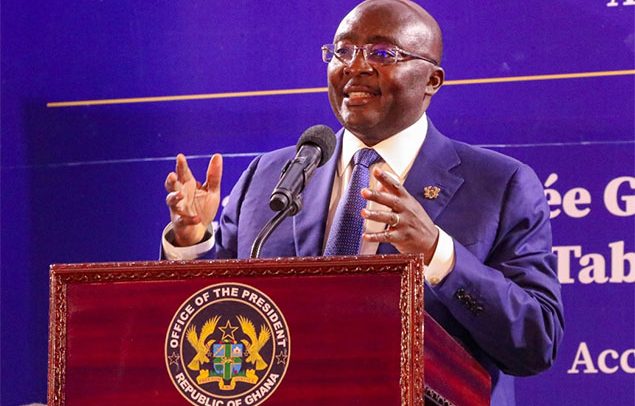Vice President Dr. Mahamudu Bawumia has stressed the need for graduates from the Ghana Armed Forces Command and Staff College (GAFCSC) to let the teachings of the school go through them and not the other way around where some go through school without applying the knowledge acquired.
That, he said, was imperative to ensure that stability and the tenets of democracy were always upheld.
This was during the joint graduation ceremony for Senior Command and Staff Course 45 and Master of Science in Defence and International Politics (MDIP) at the Ghana Armed Forces Command and Staff College (GAFCSC) in Accra.
Dr. Bawumia who also touched on the forthcoming elections, said regardless of their free and fair nature over the years, elections in the country had been fraught with security challenges and have in some instances, resulted in fatalities.
He said governments in the Fourth Republic depended on the professionalism, and discipline of the Ghana Armed Forces (GAF) and other security agencies, and their resolve to discharge their duties without fear or favour.
He said the readiness and competence of the GAFCSC to run professional and academic programmes which is a blend of non-military staff also graduating with the Master’s programme was indicative of the critical role the armed forces play in shaping the minds and intellectual capacity of those who pass through the College.
He said the level of professionalism is a testament to the ethos inculcated in the men and women particularly, the officers during their training at the College.
“It is indeed at the backdrop of such high standards that the staff college has earned the envious reputation of being a centre of excellence for both military and academic studies,” he said.
Dr. Bawumia said that despite the increases in enrolment, it was equally commendable that with such increases in the course capacity over the years, the College had managed to maintain the same high standards, and learning environment and more importantly provided the needed facilities in the face of huge constraints to absorb the growing numbers.
He said the world has been experiencing a continuous shift in global power dynamics and security over the years and it is far less predictable today than it was decades ago.
However, he said, the contest of power in a multi-polar world as well as advancement in technology among others have resulted in the birth of several non-state actors with proxies of varied potency dotted across the world.
In that regard, Dr. Bawumia said, it was evident that the scope of warfare and security threats had equally changed and would continue to evolve from the traditional means and medium to a more complex structure.
The tactics of these actors such as violent extremist groups, he indicated, had changed from invasions in large groups to surgical strikes targeting key national infrastructure using cheap modified first-person view Kamikaze drones that are highly lethal aside from other equally fatal approaches.
The Vice-President was hopeful that the graduates have been armed with a repertoire of knowledge at the operational and strategic levels of operations, command, and working with paramilitary organisations, sister security agencies, intelligence agencies as well as government officials.
He was of the firm belief that the modules and seminars they had been taken through had provided them with the platform to engage and build relationships that traversed beyond the borders of the country.
On his part, the Commandant of the College, Major General Mathew Essien, said in line with the College’s determination to provide many options, it has with the approval of the control board and having satisfied accreditation requirements added another discipline namely Master of Science in Security Studies to the MDIP.
He also announced that the college would start a PhD in Defence and International Politics next month.
Major General Essien further appealed to the government and private institutions to support the college to improve the infrastructure following its growing population.
By Charles Takyi-Boadu, Presidential Correspondent


